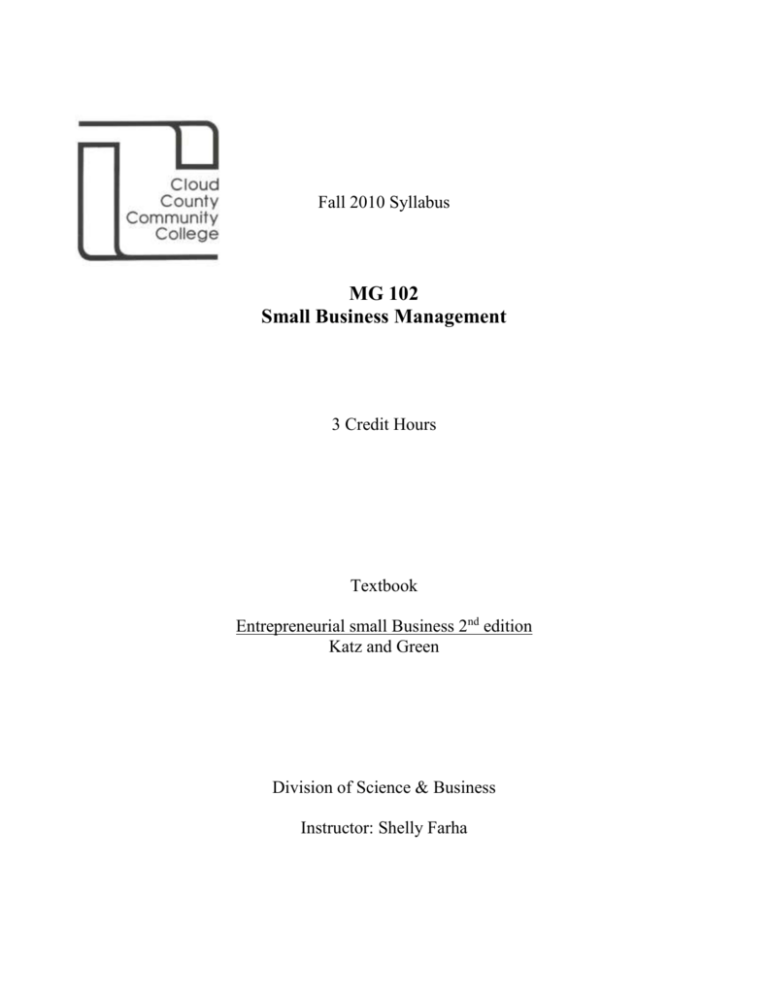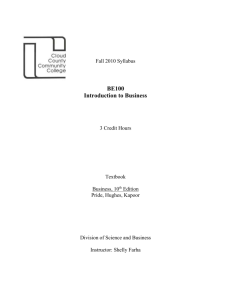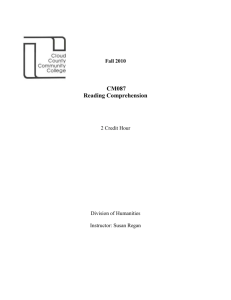MG102 Small Business Management
advertisement

Fall 2010 Syllabus MG 102 Small Business Management 3 Credit Hours Textbook Entrepreneurial small Business 2nd edition Katz and Green Division of Science & Business Instructor: Shelly Farha Small Business Management FALL 2010 Course Number: MG102 Time & Day: 9:00 – 9:55 AM, Monday, Wednesday, Friday Location: Room 256 Instructor: Shelly Farha Office: Room 231 Phone: (785) 243-1435 ext 260 (Office) (785) 243-7456 (Home) Email: sfarha@cloud.edu Required: Materials: 1. Textbook 2. Computer Access Office & Advisement Center Please see the schedule posted outside my office. Note: Responsibilities & committee assignments may place me in other areas of the college during office and Advisement Center hours. If these times are inconvenient, please make an appointment with the instructor by telephone or email. COURSE DESCRIPTION: In this course you will find information on high growth, start-up ventures, such as Dell Computer, Google and Microsoft (all started while the founders were college students, by the way!) But more importantly you will find information on the kinds of small businesses most people really do start. These are small businesses in traditional industries and markets from the “Mom and Pop” retail, a manufacturing or service business, a webbased enterprise to the sophisticated, pre-packaged franchise operation. According to the textbook authors, small businesses are vitally important to our economy and helping them survive has long been an art. In this course you will study the art and the science of small business management. The objective of the course is to help you understand the challenge before you operate your own small business. Through this course we will cover 1) Entrepreneurs and Ideas: The Basis of Small Business 2) Small Business Paths and Plans 3) Marketing in the Small Business 4) Cash, Accounting, Finance in the Small Business, and 5) Management and Organization in the Small Business. PREREQUISITE: None SEQUENCING: This class is currently offered during the fall semester and online. METHOD OF EVALUATION/GRADING: Students will be expected to complete a variety of assignments, quizzes and a final project. A student’s final grade will be evaluated according to the following grading scale: Points Possible Grading Scale A. Class Activities (10 points each) (20) 200 A = 90 – 100 B. Quizzes (25 points each) (20) 500 B = 80 – 89 C. Final Project – Business Plan 100 C = 70 – 79 Total Points Possible: 800 D = 60 – 69 F = 0 – 59 TEACHING METHODS: 1. Class Activities/Discussions/Lectures: Important material from the text and outside sources will be discussed in class. Students should plan to read material found in the text prior to class. Conceptual and explanatory information alternates with discussion and class activities. Each class activity is worth 10 points. 2. Quizzes: Twenty quizzes will be given to help ensure students comprehend the assigned material. Quizzes may include true/false, matching, completion, multiple choice, or short answer questions. Each quiz is worth 25 points. 3. Final Project - Business Plan: Each student will be responsible for developing a personal, hypothetical, Business Plan. Details of this project will be discussed with the student at a later date. This project is a significant part of the student’s grade (100 points) and replaces a comprehensive final exam. ASSIGNMENT POLICY: Students are expected to complete all reading assignments before coming to class. Late assignments will receive a 10% reduction for each class period they are late. If an assignment is not turned in until three class periods after it is due, it will receive 50% reduction in grade. Only special arrangements made with the instructor will change this policy. Make sure your name, class, and assignment title appear in the header of all assignments. It is imperative that each student do his or her own work. COURSE POLICIES ACADEMIC INTEGRITY It is imperative that each student does his/her own work. The following policy will apply to all students in class. Infractions of academic integrity (honesty) shall include: Using another student’s work without giving the student credit for the work. In other words, taking someone else’s file and placing your name on it and claiming it is yours, using another student’s quiz, or help on a quiz/exam. Giving another student your file(s) knowing that he/she intends to turn it in as his/her own creation, giving another student your quiz, or help on a quiz/exam. It is not an infraction of the policy to help another student understand how to do an assignment if he/she does the work himself/herself with your assistance. Cheating: “Cheating means getting unauthorized help on an assignment, quiz or examination.” 1. You must not receive from any other students or give to any other students any information, answers, or help during an exam. 2. You must not use unauthorized sources for answers during an exam. You must not take notes or books to the exam when such aids are forbidden, and you must not refer to any book or notes while you are taking the exam unless the instructor indicates it is an “open book” exam. 3. You must not obtain exam questions illegally before an exam or tamper with an exam after it has been corrected. Materials taken from “Academic Dishonesty in Our Classrooms.” Instructional Exchange, 1990, 2 (2), 1-4 (Newsletter available from the Office of University Assessment and Intellectual Skills Program, Western Michigan University) Plagiarism: “Plagiarism” means submitting work as your own that is someone else’s. For example, copying material from a book, the Internet, or another source without acknowledging that the words or ideas are someone else’s and not your own is plagiarism. If you copy an author’s words exactly, treat the passage as a direct quotation and supply the appropriate citation. If you use someone else’s ideas, even if you paraphrase the wording, appropriate credit should be given. You have committed plagiarism if you purchase a term paper or submit a paper as your own that you did not write. PENALTIES FOR INFRACTIONS: Any infraction will receive zero (0) credit on the assignment, quiz or exam. ATTENDANCE POLICY: Attendance in class is the student’s responsibility. Students are expected to attend class unless they are participating in scheduled school activities or have been excused by the instructor. Students cannot excessively miss class and effectively complete the course requirements. In case you are late or absent from class, it is your responsibility to get the course notes, handouts, turn in assignments, and be aware of any upcoming quiz. CONDUCT: Mature behavior is expected and required. Please respect others in the class by turning off pagers, cell phones and other disruptive devices. Thoughtful discourse is the theme of this class. You are highly encouraged to participate in the classroom discussions; points are awarded for class discussions/activities. EXAMINATION POLICY: Makeup exams will only be given by special arrangement with the instructor and must be completed within a reasonable time frame. The makeup exams may not be the same exams as given in class. NO MAKEUP exams will be allowed without prior arrangements made. INSTRUCTOR ASSISTANCE: If you are having problems with the course work or assignments, please let me know as early as possible. My office hours are intended as a time to work with students and prepare for classes. If you are unable to come during my office hours, please ask for an appointment in advance. I encourage you to use E-mail as a reliable way to contact me about any issues. TUTOR ASSISTANCE: Tutors are available in the Learning Skills Center. Contact the Learning Skills Center for more information. INCOMPLETE POLICY: Students will not be given an incomplete grade in the course without sound reason and documented as described in the Student Handbook. The incomplete must be made up with the instructor assigning the incomplete and must be completed the semester immediately following the semester in which the class was taken. Refer to the Student Handbook for a complete explanation. ACADEMIC COMPLAINTS: Cloud County Community College has an Academic Due Process Policy to address any student academic complaints. For any unresolved complaints, the policy can be obtained from the Academic Affairs Office. DEPARTMENT GOALS: Students who complete a Business/Management course at Cloud County Community College should be able to: Demonstrate business/computer literacy. Demonstrate the ability to think critically about business/computer topics. Demonstrate the ability to function in a business environment. Levels of Learning 1. The student is able to analyze and evaluate business/computer topics. 2. The student is able to define, interpret, and discuss business/computer topics. 3. The student fails to define, interpret and discuss business/computer topics. Standards: Eighty percent of the students completing a Business/Management course at Cloud County Community College will be able to define, interpret, and discuss business/computer topics (Level2). Evaluation of these goals will be ascertained through a variety of course work that may include reading, writing, discussion, projects, application of technology, and oral report assignments. ASSESSMENT OF DEPARTMENT GOALS: Instructors measure one or two department goals of all classes taught within the discipline/program within a calendar year of every odd year. Instructors submit assessment results to Department Chairs by February 1st. Department Chairs compile the information into a discipline/program report collected by Division Deans February 15th and forwarded to the assessment coordinator to be reviewed by the Student Learning Outcomes Assessment Team. COURSE GOALS (Student Learning Outcomes): Students who complete this course at Cloud County Community College will be assessed on the course competencies. See instructor for course competency sheet. ASSESSMENT of COURSE GOALS: Course goals will be assessed by evaluating the course competencies. Rubrics/Rating Scale: 3 - Skilled 2 - Moderately Skilled 1 – Exposed N – Not Exposed Eighty percent of the students will score a Level 2 or higher on eighty percent of the course competencies. Thirty percent of the students will score a Level 3 on eighty percent of the course competencies. PROGRAM EXIT GOALS: This course is part of the Business/Management program. Students who complete the Business/Management program will be expected to achieve their program competencies. Students should consult their academic advisor to review their program competencies. ASSESSMENT of PROGRAM SUCCESS: Each semester student learning success will be assessed. Rubrics/Rating Scale: 3 - Skilled 2 - Moderately Skilled 1 – Exposed N – Not Exposed 1. Ninety percent of the students will score a Level 2 or higher on one-hundred percent of the program competencies. 2. Forty percent of the students will score a Level 3 on eighty percent of the program competencies. ACCOMMODATION FOR DISABILITY: If you need academic adjustments for any type of disability, see your instructor during office hours or make an appointment. Students also may contact the Director of Advisement and Counseling, located in the Advisement Center. INCLEMENT WEATHER POLICY: In case of extremely severe weather, the college may close. The following radio and TV stations will be notified: KNCK 1390 AM Concordia KCLY 100.9 FM Clay Center KREP 92.1 FM Belleville KHCD 89.5 FM Hutchinson KVSV 1190 AM Beloit KSAL 1150 AM Salina WIBW (TV) Chan. 13 Topeka KWCH (TV) Chan. 12 Wichita KOLN (TV) Chan. 10 Lincoln, NE You may also go to www.cancellations.com Students should call the switchboard at 800-729-5101 or 785-243-1435 if they are unable to attend class due to hazardous conditions. Night class and off campus class cancellations are left to the discretion of the instructor.





